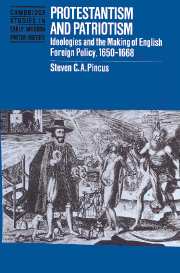Book contents
- Frontmatter
- Contents
- Acknowledgments
- List of abbreviations
- 1 Introduction
- Part I The rod of the Lord: ideology and the outbreak of the First Anglo-Dutch War
- Part II To unite against the common enemy: the 1654 Treaty of Westminster and the end of apocalyptic foreign policy
- 5 Historiographical overview
- 6 The causes of the war stated
- 7 Peace proposed
- 8 Political upheavals and ideological divisions
- 9 The rejection of apocalyptic foreign policy
- 10 The Protectorate's new foreign policy
- Part III Popery, trade, and universal monarchy: ideology and the outbreak of the Second Anglo-Dutch War
- Part IV The Medway, Breda, and the Triple Alliance: the collapse of Anglican Royalist Foreign Policy
- Conclusion
- Bibliography
- Index
- Titles in the series
8 - Political upheavals and ideological divisions
Published online by Cambridge University Press: 01 October 2009
- Frontmatter
- Contents
- Acknowledgments
- List of abbreviations
- 1 Introduction
- Part I The rod of the Lord: ideology and the outbreak of the First Anglo-Dutch War
- Part II To unite against the common enemy: the 1654 Treaty of Westminster and the end of apocalyptic foreign policy
- 5 Historiographical overview
- 6 The causes of the war stated
- 7 Peace proposed
- 8 Political upheavals and ideological divisions
- 9 The rejection of apocalyptic foreign policy
- 10 The Protectorate's new foreign policy
- Part III Popery, trade, and universal monarchy: ideology and the outbreak of the Second Anglo-Dutch War
- Part IV The Medway, Breda, and the Triple Alliance: the collapse of Anglican Royalist Foreign Policy
- Conclusion
- Bibliography
- Index
- Titles in the series
Summary
How then did the dissolution of the Rump affect the delicate Anglo-Dutch negotiations? Did English foreign policy remain unchanged, existing in a truly separate sphere from domestic developments?
There could be no question that there was a noticeable change in the English political atmosphere in the spring of 1653. As early as January 1653 Ralph Josselin had complained that the world was “not minding the heir's interest and that he viz. Christ is not only ready to claim but to take his right in the world,” adding for good measure “even so Lord Jesus come quickly.” Indeed every indication seemed to support the claim of the French ambassador Bordeaux that the Anabaptist party was on the rise. The Monday gatherings at Blackfriars had “scandalized all the whole Parliament.” In Somerset House a glazier was said to have preached “destruction to [the Rumpers] and all their adherents.” The fiery radical Vavasor Powell's sermons were so popular that the Charterhouse could not hold the thousands who came to hear him. By April there could be no doubting the “great vein of preaching against the present Parliament, and much ranting among the soldiery to the same effect.” Even an army newsletter-writer admitted that “our councils are private and high, something extraordinary is speedily expected.” Significantly foreign policy was frequently discussed in these sermons and at these gatherings. The “zealous party in the army,” observed one newsmonger, “are so gallant and resolute that they will as much scorn a peace of Holland, or any princes of the earth, as I heard them (three one after another in one day) affirm in the pulpit.”
- Type
- Chapter
- Information
- Protestantism and PatriotismIdeologies and the Making of English Foreign Policy, 1650–1668, pp. 115 - 148Publisher: Cambridge University PressPrint publication year: 1996



